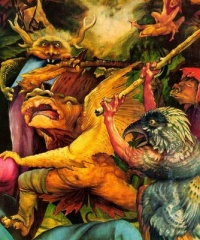Temptation
From The Art and Popular Culture Encyclopedia
| Revision as of 11:23, 19 August 2007 WikiSysop (Talk | contribs) ← Previous diff |
Revision as of 21:37, 22 September 2014 Jahsonic (Talk | contribs) Next diff → |
||
| Line 1: | Line 1: | ||
| + | [[Image:The Temptation of St. Anthony by Grunewald.jpg|thumb|right|200px|''[[The Temptation of St. Anthony]]'' ([[16th century]]) by [[Matthias Grünewald]]]] | ||
| {{Template}} | {{Template}} | ||
| + | :''[[The Temptation of St. Anthony]]'' | ||
| A '''temptation''' is an act that looks [[appeal]]ing to an individual. It is usually used to describe acts with negative connotations and as such, tends to lead a person to [[regret]] such actions, for various reasons: legal, social, psychological (including feeling [[guilt]]), health, economic, etc. Temptation also describes the coaxing or inducing a person into committing such an act, by manipulation or otherwise of [[curiosity]], [[desire]] or fear of loss. | A '''temptation''' is an act that looks [[appeal]]ing to an individual. It is usually used to describe acts with negative connotations and as such, tends to lead a person to [[regret]] such actions, for various reasons: legal, social, psychological (including feeling [[guilt]]), health, economic, etc. Temptation also describes the coaxing or inducing a person into committing such an act, by manipulation or otherwise of [[curiosity]], [[desire]] or fear of loss. | ||
| - | "Temptation" is usually used in a loose sense to describe actions which indicate a lack of self control, such as [[procrastination]] or eating [[junk food]]. | + | "Temptation" is usually used in a loose sense to describe actions which indicate a lack of [[self control]], such as [[procrastination]] or eating [[junk food]]. |
| - | Temptation is a common recurring theme in world literature. Temptation has repercussions for even the strongest. | + | Temptation is a common recurring theme in [[world literature]]. Temptation has repercussions for even the strongest. |
| - | "Temptation" is something that allures, excites, and seduces someone. | + | "Temptation" is something that [[allure]]s, excites, and [[seduce]]s someone. |
| [[Infatuation]] can also lead to temptation as someone might do something for `love` in spite of their better judgement. | [[Infatuation]] can also lead to temptation as someone might do something for `love` in spite of their better judgement. | ||
| Line 13: | Line 15: | ||
| "I can resist anything except temptation" - [[Oscar Wilde]] | "I can resist anything except temptation" - [[Oscar Wilde]] | ||
| + | |||
| + | == See also == | ||
| + | *[[Delayed gratification]] | ||
| + | *[[Seduction]] | ||
| + | *[[Sin]] | ||
| + | *[[Chastity belt]] | ||
| + | *[[The Temptation of St. Anthony]] | ||
| {{GFDL}} | {{GFDL}} | ||
Revision as of 21:37, 22 September 2014
|
Related e |
|
Featured: |
A temptation is an act that looks appealing to an individual. It is usually used to describe acts with negative connotations and as such, tends to lead a person to regret such actions, for various reasons: legal, social, psychological (including feeling guilt), health, economic, etc. Temptation also describes the coaxing or inducing a person into committing such an act, by manipulation or otherwise of curiosity, desire or fear of loss.
"Temptation" is usually used in a loose sense to describe actions which indicate a lack of self control, such as procrastination or eating junk food. Temptation is a common recurring theme in world literature. Temptation has repercussions for even the strongest.
"Temptation" is something that allures, excites, and seduces someone. Infatuation can also lead to temptation as someone might do something for `love` in spite of their better judgement.
In advertising, temptation is a theme common to many of the marketing and advertising techniques used to make products more attractive for purchase by consumers.
Though at present used in many non-religious connotations, the term has implications deeply rooted in Christianity, starting with the story of Eve and the original sin.
"I can resist anything except temptation" - Oscar Wilde
See also


